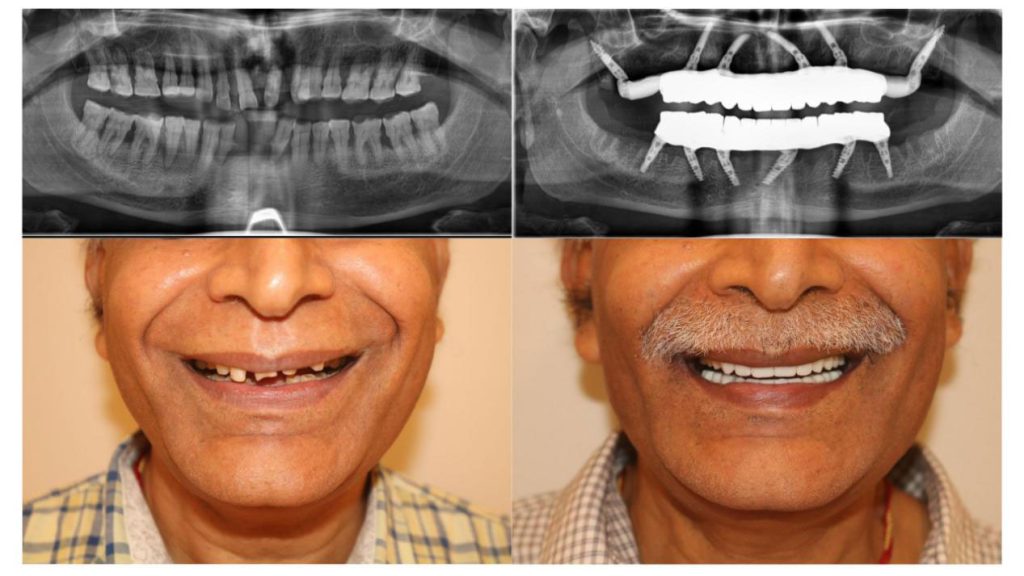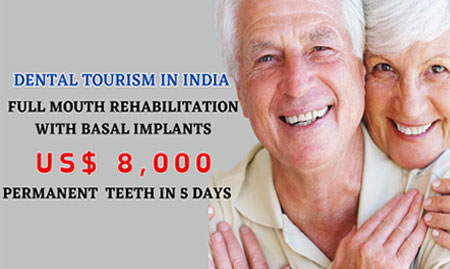
Dr. K Sharada Reddy, Author
Senior Dentist & Full Mouth Rehabilitation Expert
Losing teeth due to age, diabetes, smoking, or poor bone quality can affect your ability to chew, speak, and smile confidently. Many patients, especially elderly, diabetic, or smokers, worry that dental implants may not be suitable for them. With modern implantology and the CPBCCI protocol (Crestal Polished Bicortical Conventional Implants), full mouth restoration with permanent fixed teeth has become a safe, predictable, and minimally invasive solution even for medically compromised patients and those with insufficient bone.

Unlike conventional implants, which often require bone grafts, sinus lifts, or multiple surgeries, the CPBCCI protocol uses implants with a polished collar and a rough-surfaced body. The polished collar protects gums from infection, plaque accumulation, and peri-implantitis especially important for diabetic patients and smokers. The rough-surfaced implant body promotes faster and stronger OsseoIntegration, allowing patients with no bone for implants to receive immediate loading of permanent fixed teeth.
A key advantage of this protocol is minimally invasive keyhole implant surgery, which reduces surgical trauma, bleeding, and post operative discomfort, ensuring faster recovery. Combined with bicortical anchorage, the implants provide exceptional stability, enabling patients to regain chewing function, natural smile aesthetics, and facial support in just a few days. This is particularly beneficial for elderly patients, diabetic patients, smokers, and international dental tourists seeking long-term, reliable solutions without multiple visits.

Elderly patients benefit from the CPBCCI protocol because it avoids complex surgeries like bone grafts or sinus lifts, while minimizing recovery time through keyhole surgery. Patients can walk out with permanent fixed teeth in as little as a week, regaining chewing ability, facial aesthetics, and overall oral health without prolonged healing. Diabetic patients can safely undergo full mouth restoration with these implants. The polished collar protects the gums from infection and periimplantitis, while the rough-surfaced implant body ensures strong osseointegration. This combination allows for immediate loading of permanent fixed teeth, restoring chewing function, smile aesthetics, and oral health safely and predictably, even in patients with slower healing.
Smokers also benefit from this treatment. While smoking can slow the healing process, the combination of polished-collar implants, rough- surfaced body, bicortical anchorage, and keyhole surgery significantly reduces risks and increases success rates. With proper oral hygiene and regular follow-ups, smokers can regain permanent fixed teeth, restore chewing function, facial aesthetics, and natural smile, and enjoy a lifetime fixed solution for missing teeth.
One of the major advantages of the CPBCCI protocol is that patients with insufficient bone for implants do not need bone grafts or sinus lifts, making the procedure faster, safer, and more cost-effective, particularly for international patients and dental tourists. Most patients, including elderly, diabetic, and smokers, can receive full mouth restoration with permanent fixed teeth in just 7 days, thanks to bicortical anchorage for stability and rough-surfaced implant bodies for rapid Osseo Integration.
For international patients, this minimally invasive approach is ideal. It
reduces the number of visits, allows immediate loading of permanent fixed teeth, and provides a fully restored smile in a very short time. Patients can travel, undergo treatment, and return home with permanent fixed teeth that are designed to last a lifetime.

Many patients have questions about the suitability and safety of full mouth restoration. Elderly patients can safely undergo this treatment because the CPBCCI protocol avoids invasive surgeries, ensuring minimal discomfort and faster recovery. Diabetic patients benefit from the polished collar and rough-surfaced implant body, which protect gumsand promote strong bone integration, allowing immediate loading of permanent fixed teeth even in patients with slower healing. Smokers can also achieve successful outcomes, as the combination of keyhole surgery, bicortical anchorage, and polished-collar implants reduces risks while restoring chewing function, facial aesthetics, and natural smile.
Unlike traditional implant procedures, bone grafts or sinus lifts are not required, making the treatment safer, faster, and more convenient, especially for international patients and dental tourists. Most patients can receive permanent fixed teeth in just 7 days, restoring full chewing ability, smile aesthetics, and facial support immediately. With high- quality CPBCCI implants and proper care, full mouth restorations providea lifetime solution, offering long-term stability, function, and natural aesthetics.
In conclusion, full mouth restoration using the CPBCCI protocol is are liable, minimally invasive, and life-changing solution for elderly, diabetic, and smoker patients. By combining keyhole surgery, polished- collar implants, rough-surfaced implant bodies, and bicortical anchorage, patients regain chewing function, facial aesthetics, and natural smile in a short time. This treatment is also ideal for international dental tourism, allowing patients to restore their smile and oral health efficiently, safely, and permanently.
Frequently Asked Questions
Yes, dental implants are safe and effective for diabetic patients, especially with modern techniques like the CPBCCI protocol (Crestal Polished Bicortical Conventional Implants). Diabetes often slows healing and increases the risk of infection, but the special implant design used in this protocol overcomes these challenges. The polished collar of the implant keeps the gums healthy and prevents plaque buildup or infections, while the rough-surfaced implant body allows faster and stronger osseointegration (bonding with the bone). This means even diabetic patients with poor bone quality can receive immediate loading of permanent fixed teeth, without waiting months for healing. The minimally invasive keyhole surgery reduces pain, bleeding, and complications, ensuring a faster recovery. With proper follow-up care, controlled blood sugar, and good oral hygiene, diabetic patients can safely enjoy full mouth restoration with permanent fixed teeth that function and last a lifetime.
The CPBCCI protocol is ideal for diabetic patients because it avoids complex bone grafts and sinus lifts, which can increase healing time and risk of infection. Instead, implants are placed using keyhole surgery, a minimally invasive technique that causes less pain, minimal bleeding, and faster recovery. The bicortical anchorage provides strong stability, while the polished collar and rough-surfaced body ensure long-lasting gum health and strong bone integration. This makes the treatment predictable and safe for diabetic patients.
Yes, diabetic patients can receive immediate loading of permanent
fixed teeth with the CPBCCI protocol. Since the implants achieve strong primary stability through bicortical anchorage, teeth can be fixed with in a few days instead of waiting for months. This helps diabetic patients regain chewing function, natural smile, and facial aesthetics quickly and safely.
Before undergoing full mouth restoration, diabetic patients should ensure their blood sugar levels are not very high at least during the procedure and the healing phase, as this reduces the risk of infection and speeds up healing. Maintaining good oral hygiene, following the dentist’s instructions, are essential for the long-term success of dental implants. When managed properly, diabetic patients can enjoy permanent fixed teeth that last a lifetime.
Yes, with proper care, dental implants are a lifetime solution for diabetic patients. The polished collar prevents gum infections, while the rough-surfaced implant body ensures strong bone integration. When combined with keyhole surgery and immediate loading protocols, diabetic patients can achieve a stable, functional, and beautiful set of permanent fixed teeth that restore confidence, chewing ability, and smile aesthetics.
Absolutely. Full mouth restoration with dental implants is possible and safe for diabetic patients using the CPBCCI protocol. Unlike Conventional implants that often require bone grafts or sinus lifts, this technique uses bicortical anchorage for stability and keyhole surgery for a minimally invasive approach. This means diabetic patients can receive a complete set of permanent fixed teeth in 7 days, restoring their chewing function, smile aesthetics, and overall oral health without prolonged healing or complications.
The safest option for diabetics and smokers are implants with a polished collar and rough-surfaced implant body, like those used in the CPBCCI protocol. The polished collar reduces the risk of gum infections and peri-implantitis (a common problem in smokers and diabetics), while the rough body design ensures excellent bone integration. These implants are placed with bicortical engagement using keyhole surgery, which reduces trauma and allows for immediate loading of permanent fixed teeth. This design has proven to be predictable, safe, and long-lasting for both diabetics and smokers.
With modern techniques like the CPBCCI protocol, the success rateof
dental implants in diabetic patients is very high, comparable to that of non-diabetic patients. By ensuring primary stability through bicortical anchorage and using implants with a polished collar, the risks of infection and implant failure are minimized. Controlled blood sugar levels, good oral hygiene, and regular follow-up visits further improve long-term outcomes, making dental implants a reliable and predictable lifetime solution for diabetic patients.
Dental implants are far superior to dentures for diabetic patients. Removable dentures often cause gum irritation, sore spots, and reduced chewing efficiency, all of which can be problematic in diabetics due to slower healing. In contrast, permanent fixed teeth on implants provide stable chewing ability, prevent further bone loss, and protect the gums with the polished collar design. Since implants transmit chewing forces directly to the bone, they maintain facial structure and improve nutrition by allowing patients to eat comfortably. For diabetic patients, this not only improves oral health but also supports better over all health and quality of life compared to dentures.
Many diabetic patients worry that high sugar levels will cause implant
failure. The truth is that with proper planning, the success rate of dental
implants in diabetics is very high. The CPBCCI protocol uses bicortical anchorage, where the implant engages two layers of bone, giving excellent primary stability and reducing the risk of failure. Even if diabetes slows healing, the implant design ensures immediate stability and long-term predictability. Success also depends on controlling blood sugar, maintaining oral hygiene, When these steps are followed, implants can serve as a lifetime solution for diabetic patients.
Yes, smokers can get dental implants, but extra care is needed. Smoking reduces blood flow to the gums, slows healing, and increases the risk of infections like peri-implantitis. However, implants designed with a polished collar (as in the CPBCCI protocol) are more resistant to plaque and bacterial buildup, making them safer for smokers. The minimally invasive keyhole surgery also reduces trauma to the gums, allowing for faster recovery. Although quitting or reducing smoking before and after surgery gives the best results, many smokers still achieve long-lasting permanent fixed teeth with these implants.
It is true that smoking can reduce the success rate of dental implants when compared to non-smokers. The main reason is that smoking slows healing and makes the gums more prone to infections. However, with bicortical anchorage implants under the CPBCCI protocol, success rates are significantly higher even for smokers. The implants are designed to stay stable in strong bone and avoid gum-related complications. If as maker follows good oral hygiene, reduces smoking, and attends regular check-ups, the success rate of dental implants remains very high and predictable.




